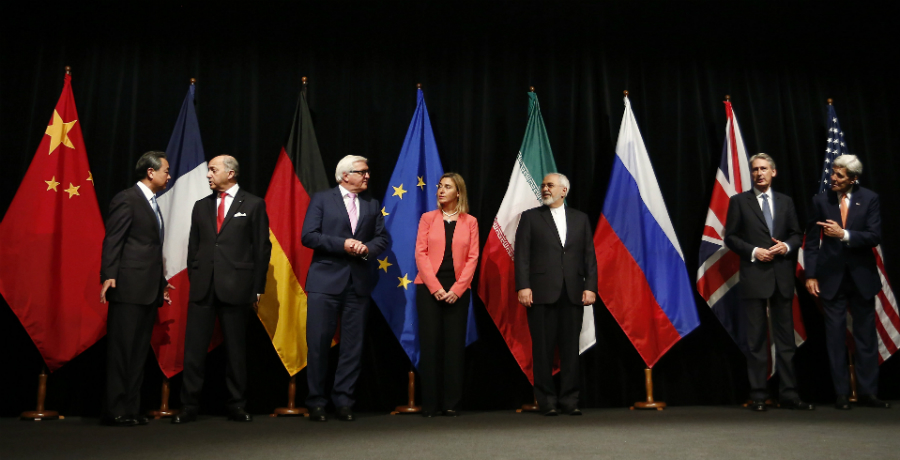If the U.S. Rejoins the JCPOA, Iran’s Power Will Not Be Unshackled
Editor’s Note: Critics of the Trump administration worry that its decision to withdraw from the Iran nuclear deal will haunt successor administrations. Iran, they fear, will emerge stronger and even more aggressive. Thomas Juneau of the University of Ottawa, however, argues that the constraints on Iran are profound and structural and that Iran would remain weak if the deal were renegotiated.
Daniel Byman
***

Published by The Lawfare Institute
in Cooperation With

Editor’s Note: Critics of the Trump administration worry that its decision to withdraw from the Iran nuclear deal will haunt successor administrations. Iran, they fear, will emerge stronger and even more aggressive. Thomas Juneau of the University of Ottawa, however, argues that the constraints on Iran are profound and structural and that Iran would remain weak if the deal were renegotiated.
Daniel Byman
***
Most prominent Democratic presidential candidates have said that they support the United States rejoining the Joint Comprehensive Plan of Action (JCPOA), the nuclear deal with Iran that came into force in 2016 and that President Trump withdrew from in 2018. A number of analysts agree: Washington should rejoin the JCPOA and negotiate follow-on agreements to resolve other points of tension between the United States and Iran. Others believe that Washington should be more patient and use the renewed sanctions imposed by the Trump administration as leverage to extract concessions from Iran as part of a renegotiation process.
Of course, new talks would face significant domestic opposition inside the United States. Iran would also have to grapple with critics within its own government. Iranian President Hassan Rouhani has said that he would be willing to engage with the United States should it reverse course, but hard-liners would resist such a path while also seeking to preserve the deal’s conditions that have allowed Iran to enhance its position as a dominant regional player. New talks would also be under pressure to resolve some issues quickly; some of the restrictions imposed by the JCPOA start expiring in 2020, and their extension, let alone any additional conditions, will likely be contentious. This has only been made more difficult by new measures adopted by the Trump administration, such as the listing of the Islamic Revolutionary Guard Corps as a terrorist organization, which will be difficult to undo and pose major obstacles to returning to the negotiating table.
The JCPOA certainly benefited Iran by partially lifting sanctions in exchange for limits on its nuclear program. Yet the claim frequently made by critics, that Iran gained significantly from the deal, is premised on a narrow reading: that by lifting some sanctions, the JCPOA unshackled Iran and overwhelmingly improved its ability to generate power and project influence. This misses the bigger picture. Most of the constraints on Iran that existed before the JCPOA have remained since 2016, as I argue in a new article in Political Science Quarterly. A new arrangement could thus allow the United States to recoup the benefits of the JCPOA—the substantial constraints on Iran’s nuclear program—while the many preexisting constraints on Iran would remain.
Constraints on Iranian Power Before the JCPOA
The many constraints on Iran’s power and influence fall into four categories: its regional environment, containment, sanctions, and economic mismanagement.
Iran’s regional position, first, is one of strategic loneliness. Its environment is highly restrictive: It is the only Persian-majority state among Arab-majority states to the west and south, Russian- and Turkic-majority states to the north, and Central and South Asian states to the east. With Iraq and tiny Azerbaijan and Bahrain, it is among the few Shiite-majority states in the world. The competitive distribution of power in the region is even more important than these identity-based features. Its neighbors Iraq, Turkey, Russia, China, Pakistan, India and Saudi Arabia are all powerful and ambitious.
These are strong regional forces converging to constrain Iran. The intensity of these constraints has varied over time, as the power of neighbors has waxed and waned. The level of revisionism of Iranian policies, especially when backed by more power, has also modulated regional responses. But underlying these variations is a baseline of strategic loneliness shaped by factors inherent to the distribution of power in the Middle East. The result is a low ceiling overall for Iran to reap gains from cooperation with its neighbors.
The United States adopted a containment policy toward Iran in the 1990s with its “dual containment” approach toward both Iran and Iraq. It now has bases and troops, or close security cooperation, with almost every state surrounding Iran, including Georgia, Azerbaijan, Afghanistan, Pakistan, Oman, the United Arab Emirates, Qatar, Bahrain, Saudi Arabia, Kuwait, Iraq and Turkey. This policy has successfully tilted the regional balance of conventional forces strongly against Iran.
This point has to be nuanced. Iran’s influence derives less from its conventional power and more from its ability to use unconventional assets, notably the nonstate actors it supports. It has also shown that it can exploit state fragility throughout the region to expand its influence. Nevertheless, the cordon sanitaire around Iran acts as a strong check on its ability to project power.
Sanctions, the third constraint, have damaged Iran’s economy for decades, with punitive consequences. Sanctions imposed after 2010 alone reduced Iran’s economy by 15 percent to 20 percent and prevented virtually any growth between 2012 and 2015. The negative impact of sanctions on oil production has been especially damaging. Prerevolutionary Iran produced around six million barrels of oil per day. Between 1979 and 2012, Iran’s production remained at or slightly beneath four million. By 2012, at the peak of the sanctions regime, exports fell to just one million. Cumulatively, this represents a tremendous loss of income.
The constraining effect of sanctions must be viewed in combination with the Iranian economy’s structural weaknesses. Iran’s economy is plagued by restrictive foreign investment laws, corruption, a politicized judiciary, a weak banking and financial sector, a bloated public sector, an inefficient tax collection system, and wasteful subsidies. This long-standing mismanagement also acts as a strong brake on economic growth and, therefore, on Iran’s power.
Iran Not Unshackled
According to its critics, the JCPOA unshackled Iranian power. Yet three of the constraints on Iran’s power remained after the JCPOA became reality, and one of them, sanctions, was only partially diluted.
First, Iran still suffers from strategic loneliness; this is a permanent condition of its international posture. Iran has made some modest gains in recent years, notably in Syria where its support, along with Russia’s, has guaranteed the survival of Bashar al-Assad’s regime. Cooperation between Iran and Russia has also reached unprecedented breadth and depth, largely as a result of these joint efforts. But this has to be caveated. In general, Iranian gains in countries such as Syria and Iraq diminish but do not change the fundamental reality of the constraints imposed by the regional structure. And specifically in Syria, Iranian gains must be weighed against the other side of the coin: Iran and Russia are stuck in a quagmire with no exit strategy. Iran is obliged to stay in Syria for years, possibly decades, to prop up a hollowed-out Assad regime, which presides over a devastated and fragmented country. At the same time, Iran’s gains from its cooperation with Russia in Syria have not been replicated elsewhere, as mistrust and suspicion still hang over the bilateral relationship.
Second, the U.S.-led multinational effort to contain Iran has not abated. Instead, it has intensified as some of Iran’s neighbors, especially Israel and Saudi Arabia, have signaled that they will respond to the JCPOA with greater efforts to counter Iranian policies.
The constraining effect of sanctions was undeniably diluted by the JCPOA, at least before the Trump administration started reimposing sanctions in 2018. In particular, the oil embargo was initially lifted and Iranian banks were reconnected to international payment systems. Yet sanctions imposed by the United States because of Iran’s support for terrorism, its human rights record, and its ballistic missile program were never lifted. These conditions that remained in force include a ban on Iran-linked dollar transactions being processed through the U.S. financial system, imposing major hurdles on non-U.S. global banks. Many—probably most—of these sanctions would remain even under a JCPOA 2.0.
Finally, the government of President Rouhani has made some progress on economic reforms. It has, notably, adopted more prudent monetary and fiscal policies than its predecessor, led by Mahmoud Ahmadinejad, and acted as a somewhat more competent steward of the economy. But these efforts have been far from sufficient to make more than a dent in mitigating the consequences of decades of economic mismanagement. The banking system, notably, is fragile. This represents an enduring constraint on the generation of Iranian power.
***
The JCPOA only partially lifted the constraints on Iran’s power. It is simply not true that because some sanctions were lifted in 2016, Iranian power skyrocketed. These formidable constraints are also unlikely to diminish in intensity soon, regardless of what new negotiations might bring. Iran’s economy will remain crippled by mismanagement. It will remain strangled by containment, and its relative military standing will not improve.
The Trump administration’s approach to Iran has been premised on an inflated assessment of Iranian power. Iran is not a hegemon on the march but a mid-sized regional power heavily constrained economically and politically. Policies that fail to recognize this have only led to costly mistakes: wasted U.S. investments in exaggerated efforts to counter Iran; squandered opportunities to cooperate on issues of shared interest; and unnecessary costs to other, more important relations with U.S. partners, including other JCPOA signatories and countries that import Iranian oil. This approach, particularly coupled with the administration’s withdrawal from the agreement, has been counterproductive and only increased the possibility that, in response to the collapse of the JCPOA, Iran could resume its nuclear weapons program and damage the nonproliferation regime, further risking conflict escalation.
A future effort by the United States to seek a new arrangement would face multiple obstacles. But the assumption underlying the position of JCPOA critics—that Iran gained significantly from the deal—is inaccurate. A more realist approach would recognize Iran’s regional power but also emphasize the limits under which it operates. A JCPOA 2.0 would seek to continue the containment of Iran, while helping to defuse current tension and open the door for further confidence-building measures.





